The changes made by the coalition government to secondary school accountability, such as the EBACC, the Wolf Review and Progress 8, have tended to be met by concern that ‘creative’ subjects will become marginalised as a result of schools placing greater emphasis on ‘academic’ subjects. In recent weeks, for example, the TES questioned whether creative subjects, such as art, design & technology and music, would be affected by the introduction of Progress 8.
There is no doubt that recent changes to the accountability regime have led to increases in entry rates in GCSEs in the EBACC subjects. Particularly since 2012, the first cohort to begin Key Stage 4 (year 10) under the coalition government, the percentage of pupils entering at least one full GCSE[1] (2 in science) in the EBACC subjects of geography, history, science and languages has risen. Nonetheless, entry rates in languages and science remain below 2005 levels.
Percentage of Pupils entered in GCSEs in EBACC subjects 2005 to 2014
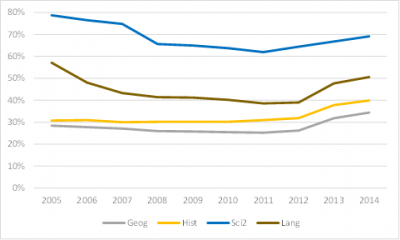
Among the non-EBACC subjects, The figure below suggests that there has been some improvement in entry rates in some subjects. Since 2005 there has been a sustained increase in GCSE religious education in which entry rates in London’s schools are particularly healthy; almost 60% of pupils in inner London were entered in 2014 compared to a national average of 43%. Entry rates in ICT increased have sharply increased since 2012. Some of this can be attributed to the inclusion of computing in the EBACC in 2014. But even without these entries, the national average in 2014 would have stood at 15% instead of 17%. By contrast, entry rates in art & design and PE/ sport studies have only experienced a modest upturn in response to the Wolf Review. They remain slightly below 2005 levels.
Percentage of Pupils entered in GCSEs in art & design, ICT, PE/ sport studies and religious education 2005 to 2014
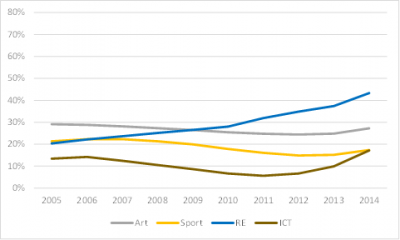
Increases in GCSE entry rates in recent years in the subjects shown above have tended to coincide with falling entry rates in similar subjects in non-GCSE qualifications (shown below). Most of the increase in in GCSE religious education has been at the expense of short course GCSE (equivalent to half a full GCSE) in religious studies. Most of the growth in vocational qualifications in England’s schools over the last ten years has tended to be in ICT, applied science (not shown) and, to a lesser extent, PE/ sport studies.
Percentage of Pupils entered in qualifications other than GCSEs in art & design, ICT, PE/ sport studies and religious education 2005 to 2014
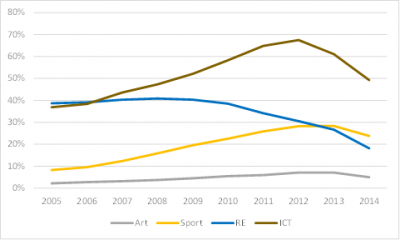
However, the picture in other subject areas is not quite so healthy. Figure 4 shows that entry rates in GCSE design & technology, home economics (including food technology) and, to a lesser extent, performing arts (which includes dance and drama) have been in decline for some time, predating the coalition government. Entry rates in GCSE music have been rather flat at between 6% and 8% over the last ten years. Tiny increases were evident in entry rates for these subjects in 2014.
Percentage of Pupils entered in GCSEs in design & technology, home economics, music and performing arts 2005 to 2014

Unlike in ICT and PE/sport studies, entry rates in non-GCSE qualifications in the subject areas shown in above have tended to be relatively low. In other words, the decline of GCSE in design and technology did not coincide with a substantial rise in vocational design and technology, rather a rise in other vocational subjects, particularly ICT. We will return to the decline of design and technology in a future blog
Percentage of Pupils entered in non-GCSEs in design & technology, home economics, music and performing arts 2005 to 2014
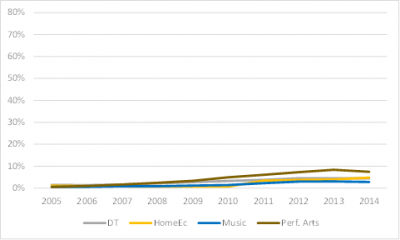
Some of the increase in entry rates in GCSEs in creative subjects in 2014 may be due to a maximum of two vocational qualifications counting in headline measures in School Performance Tables in both 2014 and 2015. This cap will be lifted in 2016 when three vocational subjects can be counted in the optional slots of Attainment 8 and Progress 8. However, the vocational subjects that will be eligible for Performance Tables in 2016 will not necessarily be an easy option and GCSEs in creative subjects may even continue to increase in popularity.


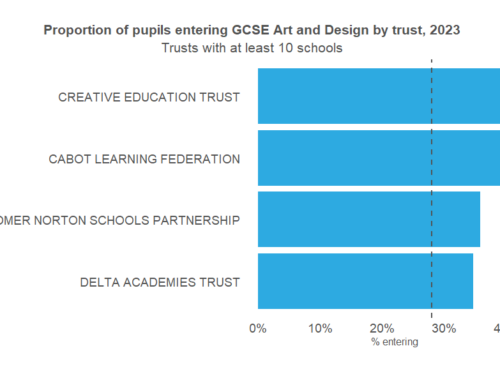
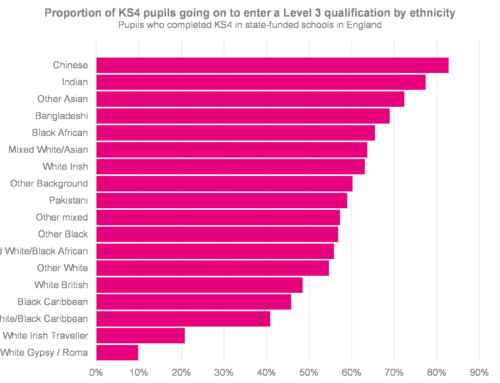
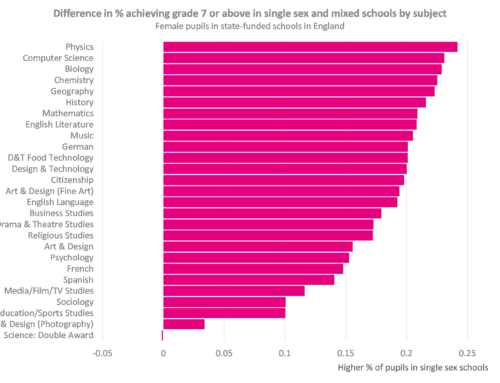
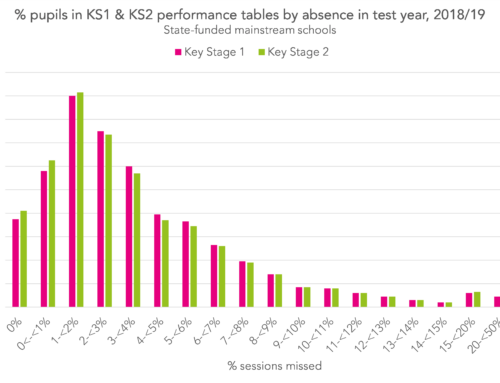
What do they expect we they have put all the students in ebacc! There is going to be turmoil in this country’s education system! It’s ran by foolish people who have no idea! They need to look at other countries and stop copying them but looking at the UK system!!!